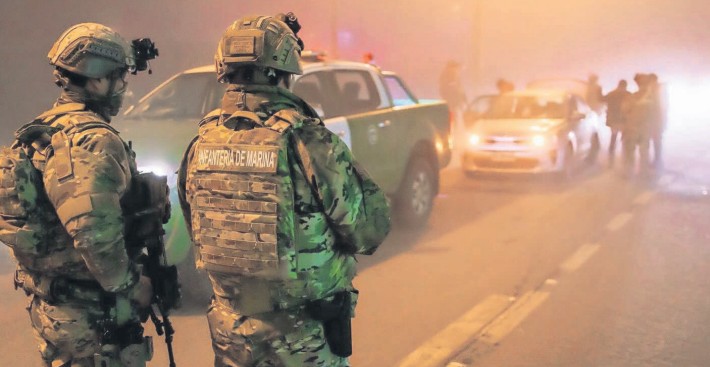- The nighttime curfew remained in effect for two and a half months to facilitate the investigative work regarding the crime in which three police officers were murdered.
For nearly a month and a half, mobility restrictions during nighttime hours were maintained in the three communes that make up the southern cone of the Arauco Province, resulting in at least 10 people being detained for violating the curfew.
This is an area that has been the focus of the investigation seeking to clarify the violent homicide of three police officers in Cañete in late April, and which has also been under a state of emergency for over two years due to acts of violence occurring in the territory.
The head of National Defense for the provinces under this measure, Rear Admiral Oscar Manzano, detailed that efforts currently remain focused on ensuring public order, primarily through mixed patrols, checkpoints, and inspections to fulfill security tasks, whose implementation is adjusted "according to the information obtained from areas identified as more critical and the requirements of civil entities."
CURFEW
As of last Saturday, the Biobío National Defense Headquarters lifted the curfew that had been in effect since April 27 in the communes of Contulmo, Cañete, and Tirúa—a measure aimed at facilitating investigative procedures for the triple homicide of police officers, which remains an open case.
Regarding this measure, the rear admiral stated that during these months, pedestrian and vehicular movement was restricted during limited nighttime hours, a provision that also helped safeguard the security of residents in the affected communes.
When asked about the number of people detained for violating this measure since its implementation, Manzano stated, "In general, people have been very respectful of the provision and its compliance; however, over 10 individuals have been detained for moving during curfew hours without their respective permits, who were also committing other types of infractions."
Along these lines, before the decree's suspension was announced, he commented, "The work of the Armed Forces has not changed much from what has been done so far—that is, our role continues to be joint work with the police during patrols, inspections, control, and support in police procedures required by the Public Prosecutor's Office."
RESULTS
The rear admiral highlighted that through security actions, efforts are focused on combating illegal activities such as timber theft still present in the area, organized crime gangs, drug trafficking, and vehicle theft. He added, "Within the framework of the interagency work we have been developing for some time, it has allowed us to carry out a strategy aimed at dismantling organized groups and their logistics."
"In this context, operations have been conducted in various locations across both provinces, resulting in the detention of persons of interest and the seizure of machinery and materials used in illegal activities (...) Unauthorized transport trucks have been taken off the road, stolen vehicles have been recovered, and individuals have been detained for violations of Law 20,000," he added.
Additionally, given the mobility of crimes between regions, in recent weeks Jedena has reported various joint operations involving the Army, Navy, and police in the regional borders of Biobío and La Araucanía, such as a series of vehicle checkpoints on Route P60 between Purén and Contulmo. The deployment of the No. 17 Los Ángeles Mountain Detachment in the Biobío Province also continues.
Source: subscription edition ofEl Sur







Comentarios (0)
No hay comentarios aún. ¡Sé el primero en comentar!
Deja un comentario